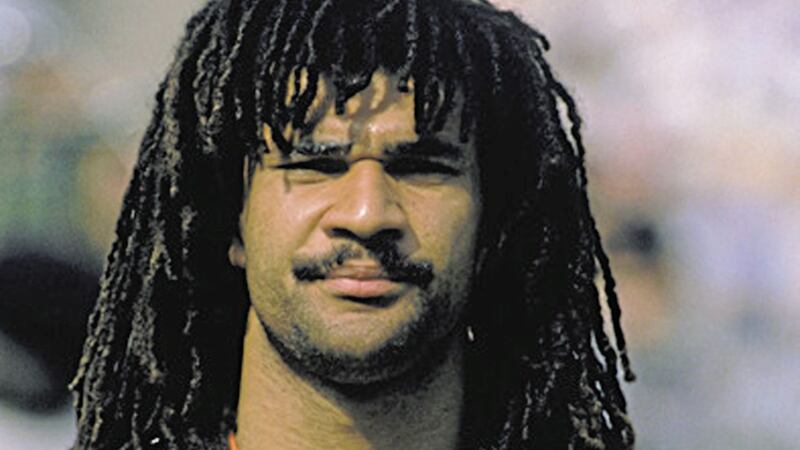UNLIKE the wall-to-wall football coverage of today, back in 1989, you had to be content with 15 minutes of highlights from the European Cup semi-finals.
The BBC’s midweek sports programme – Sportsnight – was as good as it got back then.
I remember the teeming rain at the San Siro and being mesmerised by AC Milan who’d just thumped Real Madrid 5-0 in the second leg of their European Cup semi-final.
The languid grace and ruthless finishing of Marco Van Basten. The balletic poise and raw power of Ruud Gullit. The impenetrable Frank Rijkaard. Three Dutch Rolls Royces woven seamlessly into the DNA of Serie A.
Franco Baresi, arguably the best defender who ever played the game. A young, defiant Paolo Maldini.
Roberto Donadoni, one of the most exciting and consistent wingers of the modern era. And midfield general Carlo Ancelotti who scored a screamer in that 5-0 mauling of Madrid.
That performance in April 1989 was the point when Arrigo Sacchi’s brilliant AC Milan team announced themselves on the European and world stage.
Revolution is a word used too often these days but what the little-known Sacchi implemented at AC Milan was exactly that.
His high-press, compact philosophy changed the face of Italian football.
Catenaccio was dead. Flat back fours were king.
No longer would the top clubs be convinced of the merits of playing a deep-lying ‘libero’ especially when the inspired Rossoneri didn’t allow you to breathe.
And it was all down to this bald, diminutive, energetic, enigmatic figure who’d clawed his way to the top from humble beginnings.
Alessandro Costacurta, who formed an awesome central defensive partnership with Baresi during those years, said in a subsequent interview: “What did I think after Sacchi’s first training session? This bloke will last two months.”
If it hadn’t been for club president and political high flyer Silvio Berlusconi taking a huge gamble, we might never have heard of Arrigo Sacchi - and Italian football probably would have trundled along on its own narcissistic way.
He won the Scudetto in his first season in charge of Milan and swept to back-to-back European Cups in 1989 and ’90.
In 2019, Sacchi penned a quite brilliant memoir ‘The Immortals – the season my Milan team reinvented football’.
Just recently, the 174-page memoir has been translated into English – and we should give thanks and praise to Back Page Press who are earning a reputation for publishing books for the more discerning sports fan.
Sacchi’s memoir stands admirably beside Andrea Pirlo’s unique autobiography, entitled: ‘I think therefore I play’ and Graham Hunter’s outstanding tome on ‘Barca – the making of the greatest team in the world’.
Sacchi’s dramatic success on the training pitch and in the dug-out was just too good of a story not to be told.
For those of a certain vintage will love this book, Sacchi’s climb to the top, the back stories, the tactics, his irreverent commentary on famous players we were lucky to see every two years at major tournaments or a 15-minute segment on television and trying to convince Berlusconi to dispense with the grossly over-rated Argentina international Claudio Borghi.
It was in the pre-Bosman days where clubs could only play three foreign players.
Although Berlusconi gave Sacchi his biggest break in football, the president believed Borghi, who was part of Argentina’s 1986 World Cup squad, was the best thing since bread came sliced. Only he wasn’t.
Sacchi wanted Rijkaard as his third foreign player and Berlusconi wanted Borghi. The manager eventually won.
On Borghi, Sacchi writes: “After a short and sad parenthesis in Switzerland, Borghi resigned himself to going back to South America, where he finished off an anonymous career. He scored once for Argentina. He wasn’t the new Maradona after all. False alarm.”
Of course, Sacchi’s account is not without its flaws – if they are flaws at all. Is narcissism a flaw in a book?
In some ways, Sacchi’s lofty opinion of himself occasionally adds to his story. But he probably didn’t have to blow his own trumpet too hard because his fantastic body of work at the San Siro speaks for itself and easily stands the test of time.
Tactical innovation didn’t begin with Pep Guardiola or Jurgen Klopp.
Both men, in fairness, don’t purport to have invented the high press.
Who knows, maybe there is someone buried deep in football’s archives who was doing what Sacchi was doing 50 years earlier.
Regardless, the proficiency of Sacchi’s work, especially at Milan, and his sheer charismatic presence around the late 80s and early 90s – which included an unlikely 1994 World Cup final appearance with his native Italy - is worth acknowledging when people discuss football’s historic game-changers.
In explaining his philosophy, he writes: “The closer to the opposition goal you win the ball back, the higher the chance of scoring. But to carry it out, the team needs to be organised and working in synergy – tight and compact. Always. Pressing done well saves energy: where you can manage a thousand little bursts per game, the number of 30m sprints you can do is much lower.”
He continues: “In that kind of system, a midfielder like Ancelotti – who had 20 per cent lower capacity in his legs – could control the play quite happily, whereas he would have found it a lot harder had he been asked to cover large areas.”
Sacchi presents his philosophy in clear and colourful terms that will keep the reader fully engaged.
Arguably the more enjoyable aspects of the memoir, however, is the veteran coach’s musings on Van Basten and Gullit – two of the three flying Dutchmen that made his job a lot easier.
“Van Basten had a very particular character,” writes Sacchi. “He could literally change with the weather – a difference in air pressure or temperature seemed to provoke an injury. But he was also a brilliant player whom I wouldn’t have swapped even for the best striker of the modern era – the Brazilian Ronaldo.”
On Gullit, Sacchi writes: “The smallest pain was enough to stop him. He spent too much time thinking about women and he was always injured.”
Now 75, Sacchi also observed that the dreadlocked Dutchman always produced the goods on the big occasion.
“Gullit had two pretty normal feet, and when he played games of football tennis at Milanello, everyone wanted to be on Christian Lantignotti’s team, not Ruud’s…[But] In the middle of a match, Ruud’s feet magically became the best… he had the charisma and personality of a great champion and made everyone feel stronger.”
The greatest thing about 'The Immortals' by Arrigo Sacchi is that it found its way into print.
It's an exceptional read and adds richly to the discourse of modern football.








